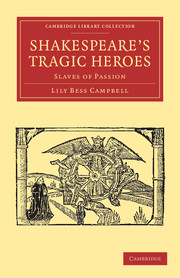CHAPTER ONE
The Mirrors of Fortune. The Problem of Evil. The Problem of Justice. How God Revenges Sin.
Published online by Cambridge University Press: 07 September 2010
Summary
The problem of tragedy has always been the problem of evil in the world. The presentation of the evil that befalls men is but one of the concerns of tragedy; the other and the more important is the explanation of the why of the evil so presented. Thus it is that tragedy and philosophy, tragedy and religion, must always have much in common. And if we are to find the meaning of Shakespeare's tragedies, we must find how men looked at this problem of evil in the day when these tragedies were first played to English audiences. We must, therefore, look to such explanations as were given both by writers of tragedies and by philosophers in Shakespeare's time, but these explanations will best be understood when we can trace them from their mediaeval origins through their period of modification by the re-born classical philosophy and classical literature.
Chaucer's Monk's Tale testifies to the fact that tragedies were considered as exempla to warn men of the fickleness of fortune and of the causes why men fell from weal to woe. The Monk begins:
I wol biwaille, in manere of tragedie,
The harm of hem that stoode in heigh degree,
And fillen so that ther nas no remedie
To brynge hem out of hir adversitee;
For certein, whan that Fortune list to flee,
Ther may no man the cours of hire withholde.
Lat no man truste on blynd prosperitee;
Be war by thise ensamples trewe and olde.
- Type
- Chapter
- Information
- Shakespeare's Tragic HeroesSlaves of Passion, pp. 3 - 24Publisher: Cambridge University PressPrint publication year: 2009First published in: 1930
- 1
- Cited by

